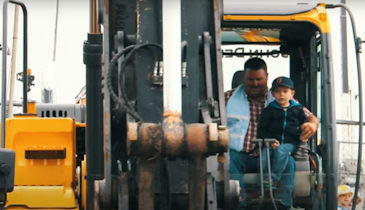The arrival of consumer-affordable global positioning system (GPS) technology has started revolutions in everything from how we use maps (Google Earth) and drive (MapQuest and TomTom), to perceived safety in the wilderness (Nextel and other GPS-equipped cell phone tracking devices).
Many businesses see huge advantages in GPS fleet tracking. One web site says, “A majority of leading companies are using GPS fleet management solutions to realize benefits such as a 12.2 percent increase in service profitability, 13 percent improvement in vehicle utilization, 14.8 percent reduction in average travel time per job, 9.9 percent decrease in overtime pay, and 27.9 percent increase in operator compliance. The deployment of a GPS fleet management solution often results in an average annual savings of $1,100 per vehicle.”
While this may be true, some employees regard fleet tracking systems as the not-so-subtle intrusion of Big Brother into the non-fiction side of life. However you regard it, the technology is here to stay. Here, operators weigh in on the value of GPS fleet tracking to their businesses.
The City of Tacoma uses GPS fleet tracking primarily as a tool to verify the location of any piece of equipment at any given time. According to Steve Jackson, senior sewer worker, the city has used the system in situations when customers call to ask why a city truck is parked at one location for a long time.
“We haven’t yet used it as a dispatching tool,” Jackson reports. “It’s not refined enough yet to be useful in that respect. Initially, we used the GPS to overlap dispatching around other municipal departments.”
This incomplete use of the full spectrum of GPS features has more to do with budget than anything else. Though the equipment itself — the base and transponder units — and the service subscriptions are relatively inexpensive, the part that links them together is still fairly costly.
“Our department isn’t live with it yet,” explains Jackson. “That’s because it’s used primarily for the safety sectors. Police and fire vehicles have dispatch priority over our expensive satellite feed.” As with any new technology, this disparity will likely diminish as the cost of the full technology components, including satellite signals, declines.
“They’re multi-faceted in use at our company,” says Gary Hannibal of S & M Vacuum & Waste of Killeen, Texas. The company runs its own liquid waste processing facility, services commercial wastewater treatment plants, hauls construction waste, and pumps some residential septic systems. S & M instituted GPS fleet monitoring primarily as a dispatching aid.
“We use GPS for keeping track of where our trucks are at any time of day or month,” says Hannibal. “It’s mostly been good for dispatching: They can know what area we’re in, and whether or not they can send us to someplace close.”
In this function, the units help the company make the most efficient use of vehicles, saving time and fuel — increasingly important as prices continue to rise. “It’s also used as verification for customers that we were actually at their location,” explains Hannibal. “The office keeps a digital file of all truck visits. It’s made it easier for the office, helping settle disputes about whether we actually made calls or not.
“With one customer, we did make our scheduled calls, but the customer called to complain that we didn’t. What actually happened is they were either away from their place or just weren’t paying attention and didn’t see us.” With the digital record, the dispatcher was able to prove that the drivers had made their scheduled call, and the dispute was resolved.
Jerry Fannon, general manager of his family’s plumbing, inspection and pipe rehabilitation company, Bio-Remedies Inc., no longer uses GPS fleet tracking.
“We tried that when we had Nextel phones, and it was worthless,” he says. “We really only wanted to track a few of our trucks, but it didn’t work. With the crew I’ve got now, I don’t need to do that. We assign guys by projects all across the town, which is divided into quadrants. We put a more experienced guy close by a rookie, who can be pulled off a maintenance job if needed.
“They call in each invoice to our dispatcher or to me to report the job finished and get their next assignment. Sometimes we need them to take care of an emergency before the next scheduled job, but we can easily make that a dispatch function.
“To keep track of each technician’s time, we match jobs to invoice numbers to timecards, so everything’s coordinated. This method keeps it simple, but it also keeps a short leash on wasted time between jobs. It’s more effective and less hassle than worrying about making sure everyone has their GPS unit, keeps it turned on and learns how to get the reports from it.”





